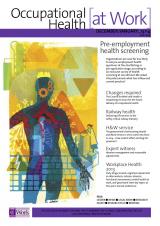December/January 2013/2014 (vol. 10/4)
ContentsFeaturesNewsLegal
NewsResearch DigestResearch PlusCPD
Research Plus
Cost-effective intervention
A worksite intervention to improve the health of construction workers proved cost-effective in terms of reducing sickness absence even though it had no impact on measured health outcomes. A total of 293 workers took part in a cluster randomised controlled trial involving 15 departments across six Dutch construction companies – eight departments randomised to the intervention and seven to the control. The six-month intervention consisted of individual training sessions with a physiotherapist to reduce physical workload, an instrument to raise awareness of the importance of rest breaks, and two ‘empowerment’ group training sessions, delivered alongside standard health and safety ‘toolbox’ training. The control groups received only the health and safety training. At 12 months, there were no significant improvements in work ability, health or mental health, or musculoskeletal symptoms. However, the mean employer cost associated with sickness absence was significantly lower in the intervention group than in the control group (-€760; CI: –€1,497 to –€156). Employer costs remained significantly lower after including the cost of the intervention; saving €6.4 for every €1 invested.
Prevention program at construction worksites aimed at improving health and work ability is cost-saving to the employer: Results from an RCT. American Journal of Industrial Medicine 2013; online first: doi: 10.1002/ajim.22267.
Occupational Health at Work December/January 2013/2014 (vol. 10/4) pp46



